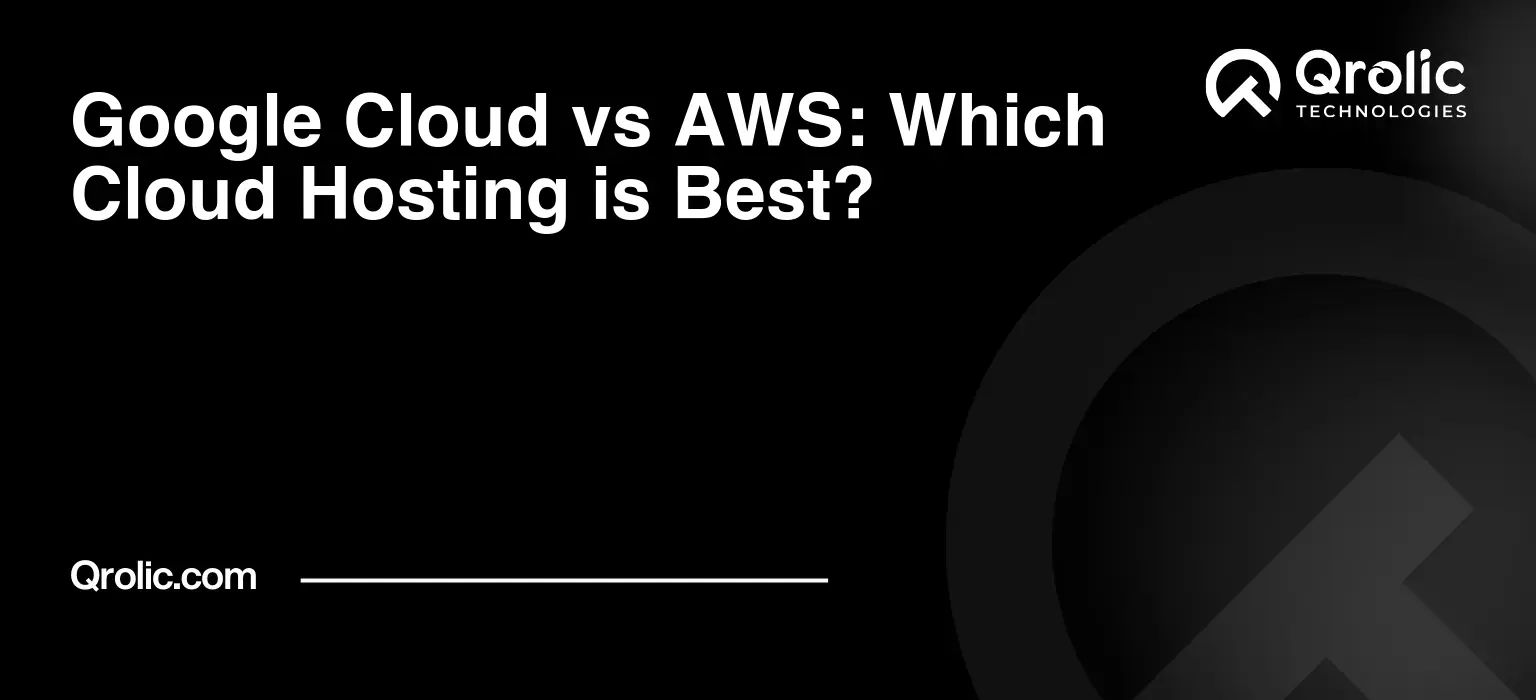Choosing the right cloud hosting provider is like picking the perfect partner for a long and complex journey. It’s a decision that can significantly impact your business’s success, agility, and bottom line. Two giants dominate this landscape: Google Cloud Platform (GCP) and Amazon Web Services (AWS). Both offer a vast array of services, but understanding their nuances is crucial to making an informed choice. This comprehensive guide delves deep into the Google Cloud vs AWS debate, dissecting their strengths, weaknesses, pricing models, and specific use cases to help you determine which cloud hosting provider truly reigns supreme for your needs.
Quick Summary:
- AWS offers broad services; GCP excels in AI/Kubernetes.
- Your best cloud depends on your unique business needs.
- Evaluate costs, services, and team skills carefully.
- Consider testing platforms and optimizing your usage.
Table of Contents
- What is Cloud Hosting and Why Should You Care?
- Google Cloud vs AWS: A Head-to-Head Comparison
- 1. Compute Power: The Engine Room
- 2. Storage Solutions: Where Your Data Resides
- 3. Databases: The Heart of Your Applications
- 4. Networking: Connecting the Dots
- 5. Pricing: The Bottom Line
- 6. Security: Protecting Your Assets
- 7. Geographic Availability: Reaching Your Global Audience
- 8. Ease of Use: Getting Started and Staying Efficient
- When to Choose AWS: Specific Scenarios
- When to Choose Google Cloud: Specific Scenarios
- Beyond the Basics: Advanced Considerations
- Qrolic Technologies: Your Cloud Expertise Partner
- Making the Right Choice: A Step-by-Step Guide
- Conclusion: The Best Cloud Hosting Provider is the One That Fits You
What is Cloud Hosting and Why Should You Care?
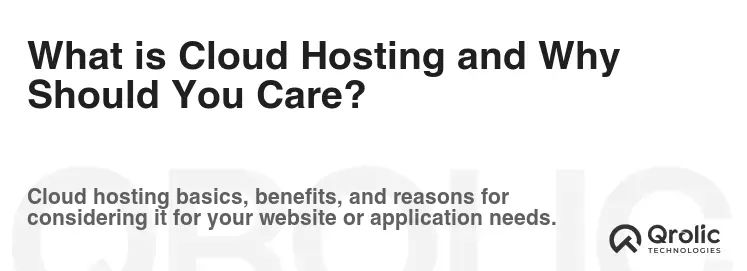
Before we dive into the specifics of Google Cloud and AWS, let’s quickly revisit the foundational concept of cloud hosting. Imagine your traditional IT infrastructure – servers, storage, networking – all physically housed within your own data center. Cloud hosting, in essence, shifts this infrastructure to a remote data center owned and managed by a third-party provider. This allows you to access computing resources over the internet, paying only for what you use.
Why is this a game-changer?
- Scalability: Need more computing power? Simply scale up your resources on demand, without the lengthy procurement processes and capital expenditure associated with traditional infrastructure.
- Cost-Effectiveness: Eliminate the costs associated with maintaining your own data center – hardware, software, electricity, and IT staff. Pay-as-you-go pricing models ensure you only pay for the resources you actually consume.
- Reliability: Cloud providers invest heavily in redundant infrastructure and disaster recovery mechanisms, ensuring high availability and minimizing downtime.
- Flexibility: Access a wide range of services and tools, from virtual machines and storage to databases, analytics, and machine learning.
- Innovation: Cloud providers are constantly innovating, introducing new services and features to help you stay ahead of the curve.
In short, cloud hosting allows businesses to focus on their core competencies, rather than managing complex IT infrastructure. This leads to increased agility, reduced costs, and faster time-to-market.
Google Cloud vs AWS: A Head-to-Head Comparison
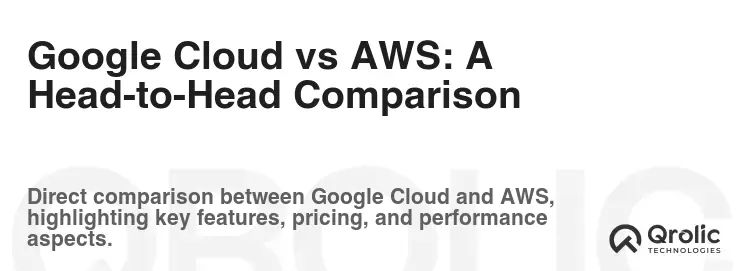
Now, let’s get to the heart of the matter: comparing Google Cloud and AWS across various critical dimensions.
1. Compute Power: The Engine Room
Both Google Cloud and AWS offer a comprehensive suite of compute services, allowing you to run your applications and workloads in the cloud.
- Amazon Web Services (AWS): AWS offers a wide range of compute options, including:
- Amazon EC2 (Elastic Compute Cloud): Virtual servers in the cloud, offering a vast selection of instance types optimized for different workloads (general purpose, compute-optimized, memory-optimized, GPU instances, etc.). Think of EC2 as the workhorse of AWS, suitable for almost anything.
- Amazon Lambda: Serverless compute service, allowing you to run code without provisioning or managing servers. Ideal for event-driven applications and microservices.
- Amazon ECS (Elastic Container Service): Container orchestration service, allowing you to deploy, manage, and scale containerized applications.
- Amazon EKS (Elastic Kubernetes Service): Managed Kubernetes service, simplifying the deployment and management of Kubernetes clusters.
- AWS Fargate: Serverless compute engine for containers, allowing you to run containers without managing underlying infrastructure.
- Google Cloud Platform (GCP): GCP also provides a robust set of compute services:
- Google Compute Engine: Virtual machines in the cloud, offering a variety of instance types and customizable machine types. Similar to EC2, Compute Engine provides the foundation for most cloud workloads.
- Google Cloud Functions: Serverless compute service, similar to AWS Lambda.
- Google Kubernetes Engine (GKE): Managed Kubernetes service, a pioneer in the Kubernetes space, offering a robust and mature platform. GKE is often lauded for its ease of use and tight integration with other Google Cloud services.
- Google Cloud Run: Serverless container execution service, allowing you to run containerized applications without managing underlying infrastructure.
The Verdict:
- AWS excels in: Breadth of instance types. With its vast selection of EC2 instance types, AWS offers a highly granular level of control over resource allocation and cost optimization.
- GCP excels in: Kubernetes expertise. Google, the creator of Kubernetes, offers a particularly strong managed Kubernetes service with GKE.
Consider this: If you need extreme flexibility and fine-grained control over your virtual machine configurations, AWS might be a better fit. If you’re heavily invested in Kubernetes and prioritize ease of use and a mature platform, GCP is a strong contender.
2. Storage Solutions: Where Your Data Resides
Storing your data securely and efficiently is paramount. Both AWS and GCP offer a variety of storage options, catering to different needs and use cases.
- Amazon Web Services (AWS):
- Amazon S3 (Simple Storage Service): Object storage service, ideal for storing unstructured data such as images, videos, and documents. Think of S3 as a vast, scalable, and cost-effective data lake.
- Amazon EBS (Elastic Block Storage): Block storage volumes for use with EC2 instances, providing persistent storage for operating systems, databases, and applications.
- Amazon EFS (Elastic File System): Shared file system for use with EC2 instances, allowing multiple instances to access the same files simultaneously.
- Amazon Glacier: Low-cost archive storage service for infrequently accessed data.
- AWS Storage Gateway: Hybrid cloud storage service, allowing you to connect your on-premises storage to AWS.
- Google Cloud Platform (GCP):
- Google Cloud Storage: Object storage service, similar to Amazon S3.
- Google Persistent Disk: Block storage volumes for use with Compute Engine instances, similar to Amazon EBS.
- Google Cloud Filestore: Shared file system for use with Compute Engine instances, similar to Amazon EFS.
- Google Cloud Archive Storage: Low-cost archive storage service for infrequently accessed data, comparable to Amazon Glacier.
The Verdict:
- AWS excels in: Mature and well-established ecosystem. S3, in particular, is a highly mature and widely adopted object storage service.
- GCP excels in: Data analytics integration. Google Cloud Storage seamlessly integrates with Google’s powerful data analytics tools, such as BigQuery.
Consider this: If you need a highly reliable and cost-effective object storage solution with a vast ecosystem, AWS S3 is a solid choice. If you plan to leverage Google’s data analytics capabilities, Google Cloud Storage might be a better fit.
3. Databases: The Heart of Your Applications
Databases are crucial for storing and managing structured data. Both AWS and GCP offer a diverse range of database options, from relational databases to NoSQL databases.
- Amazon Web Services (AWS):
- Amazon RDS (Relational Database Service): Managed relational database service, supporting popular databases such as MySQL, PostgreSQL, MariaDB, Oracle, and SQL Server.
- Amazon Aurora: MySQL- and PostgreSQL-compatible relational database, offering high performance and availability.
- Amazon DynamoDB: NoSQL database service, offering high scalability and low latency.
- Amazon Redshift: Data warehouse service, optimized for large-scale data analysis.
- Amazon DocumentDB: MongoDB-compatible document database service.
- Amazon Neptune: Graph database service.
- Google Cloud Platform (GCP):
- Google Cloud SQL: Managed relational database service, supporting MySQL, PostgreSQL, and SQL Server.
- Google Cloud Spanner: Globally distributed, scalable, and strongly consistent database service. A unique offering with impressive capabilities.
- Google Cloud Datastore: NoSQL database service.
- Google BigQuery: Data warehouse service, known for its fast query performance and cost-effectiveness.
- Google Cloud Firestore: NoSQL document database service, optimized for mobile and web applications.
- Google Cloud Memorystore: In-memory data store service, supporting Redis and Memcached.
The Verdict:
- AWS excels in: Sheer variety and established presence. RDS offers a wide range of database engines, and DynamoDB is a highly popular NoSQL database.
- GCP excels in: Innovation and data warehousing. Cloud Spanner offers unique global scalability, and BigQuery is renowned for its analytics capabilities.
Consider this: If you need a broad selection of database options and a well-established ecosystem, AWS is a safe bet. If you require global scalability with strong consistency or are heavily focused on data warehousing and analytics, GCP offers compelling solutions.
4. Networking: Connecting the Dots
Networking is the foundation of any cloud infrastructure, enabling communication between your applications and users.
- Amazon Web Services (AWS):
- Amazon VPC (Virtual Private Cloud): Allows you to create a private network within AWS, providing isolation and security.
- Amazon Route 53: Scalable DNS service.
- Amazon CloudFront: Content delivery network (CDN), accelerating content delivery to users around the world.
- AWS Direct Connect: Dedicated network connection between your on-premises infrastructure and AWS.
- Google Cloud Platform (GCP):
- Google Cloud VPC: Allows you to create a private network within GCP, similar to Amazon VPC.
- Google Cloud DNS: Scalable DNS service.
- Google Cloud CDN: Content delivery network (CDN), integrating with Google’s global network.
- Google Cloud Interconnect: Dedicated network connection between your on-premises infrastructure and GCP.
The Verdict:
Both AWS and GCP offer robust networking capabilities. The core functionalities are largely similar, with both platforms providing virtual private clouds, DNS services, CDNs, and dedicated network connections.
Consider this: The choice between AWS and GCP networking often comes down to specific requirements, such as integration with existing on-premises infrastructure or preferred CDN features.
5. Pricing: The Bottom Line
Understanding the pricing models of AWS and GCP is crucial for cost optimization. Both providers offer complex pricing structures, with various factors influencing the final cost.
- Amazon Web Services (AWS): AWS pricing is generally considered to be more granular and complex, with numerous options and discounts available. AWS offers various pricing models, including:
- Pay-as-you-go: Pay only for the resources you consume.
- Reserved Instances: Commit to using resources for a specific period (1 or 3 years) in exchange for significant discounts.
- Spot Instances: Bid on unused EC2 capacity, offering potentially deep discounts but with the risk of interruption.
- Savings Plans: Flexible pricing model that offers savings in exchange for a commitment to a consistent amount of compute usage.
- Google Cloud Platform (GCP): GCP pricing is often perceived as being more transparent and straightforward, with sustained use discounts applied automatically. GCP offers similar pricing models:
- Pay-as-you-go: Pay only for the resources you consume.
- Committed Use Discounts: Commit to using resources for a specific period (1 or 3 years) in exchange for discounts.
- Preemptible VMs: Similar to AWS Spot Instances, offering discounted pricing but with the risk of interruption.
- Sustained Use Discounts: Automatically applied discounts based on sustained usage of virtual machines.
The Verdict:
- AWS excels in: Granularity and flexibility. The wide range of pricing options allows for highly customized cost optimization strategies.
- GCP excels in: Transparency and ease of understanding. The automatic sustained use discounts simplify cost management.
Consider this: AWS pricing can be more complex to navigate, but it offers greater potential for cost savings with careful planning and optimization. GCP pricing is generally easier to understand, but the potential cost savings might be less significant. It is crucial to use cost estimation tools and monitor your cloud spending regularly on both platforms.
6. Security: Protecting Your Assets
Security is paramount in the cloud. Both AWS and GCP invest heavily in security infrastructure and offer a wide range of security services.
- Amazon Web Services (AWS): AWS provides a comprehensive suite of security services, including:
- AWS Identity and Access Management (IAM): Controls access to AWS resources.
- Amazon GuardDuty: Threat detection service.
- Amazon Inspector: Automated security assessment service.
- AWS Shield: DDoS protection service.
- AWS Key Management Service (KMS): Manages encryption keys.
- AWS CloudHSM: Hardware security module for storing encryption keys.
- Google Cloud Platform (GCP): GCP also offers a robust set of security services:
- Google Cloud Identity and Access Management (IAM): Controls access to GCP resources.
- Google Cloud Security Command Center: Security and risk management platform.
- Google Cloud Armor: Web application firewall (WAF) and DDoS protection service.
- Google Cloud Key Management Service (KMS): Manages encryption keys.
- Google Cloud HSM: Hardware security module for storing encryption keys.
The Verdict:
Both AWS and GCP offer robust security capabilities and comply with industry-leading security standards. Security is a shared responsibility, and it’s crucial to implement appropriate security measures on both platforms.
Consider this: The choice between AWS and GCP security services often depends on specific requirements and compliance needs.
7. Geographic Availability: Reaching Your Global Audience
The geographic availability of cloud services is crucial for latency optimization and compliance with local regulations.
- Amazon Web Services (AWS): AWS has a global presence with numerous regions and availability zones around the world.
- Google Cloud Platform (GCP): GCP also has a growing global presence, with regions and zones strategically located around the world.
The Verdict:
Both AWS and GCP offer a broad global reach. The specific regions and zones available may vary, so it’s important to check the availability of services in your target regions.
Consider this: Choose the cloud provider with regions and zones located closest to your target audience to minimize latency and improve performance.
8. Ease of Use: Getting Started and Staying Efficient
Ease of use is a critical factor, especially for organizations with limited cloud expertise.
- Amazon Web Services (AWS): AWS is often perceived as being more complex to navigate due to the sheer number of services and options. The vastness of the AWS ecosystem can be overwhelming for newcomers.
- Google Cloud Platform (GCP): GCP is generally considered to be more user-friendly, with a cleaner and more intuitive interface. The smaller number of services and more streamlined approach can make it easier to get started.
The Verdict:
- AWS excels in: Advanced customization and control. The complexity allows for highly customized configurations.
- GCP excels in: Simplicity and ease of learning. The cleaner interface and more streamlined approach make it easier to get started and manage resources.
Consider this: If you prioritize simplicity and ease of learning, GCP might be a better choice. If you need advanced customization and control and are willing to invest the time to learn the AWS ecosystem, AWS is a powerful option.
When to Choose AWS: Specific Scenarios
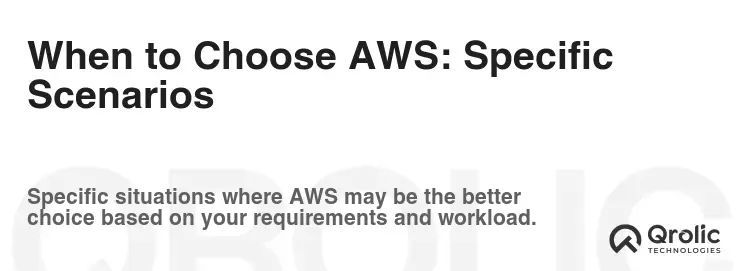
AWS is a strong choice in the following scenarios:
- Large Enterprises: AWS has a mature ecosystem and a vast array of services, making it well-suited for large enterprises with complex IT requirements.
- Established DevOps Practices: Organizations with established DevOps practices and a strong understanding of cloud infrastructure can leverage the flexibility and granularity of AWS.
- Wide Range of Applications: The sheer breadth of AWS services makes it a good fit for organizations with diverse application portfolios.
- Cost Optimization Focus: Organizations willing to invest the time and effort to optimize their AWS usage can achieve significant cost savings.
When to Choose Google Cloud: Specific Scenarios
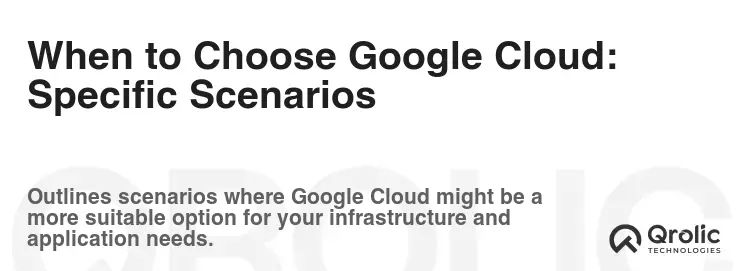
GCP is a compelling option in the following scenarios:
- Data Analytics and Machine Learning: GCP has a strong focus on data analytics and machine learning, with powerful tools like BigQuery and TensorFlow.
- Kubernetes and Containerization: Google, the creator of Kubernetes, offers a robust and mature managed Kubernetes service (GKE).
- Innovation and Cutting-Edge Technologies: GCP is known for its innovation and its focus on cutting-edge technologies.
- Startups and Smaller Businesses: The more streamlined approach and user-friendly interface of GCP can be appealing to startups and smaller businesses with limited cloud expertise.
Beyond the Basics: Advanced Considerations
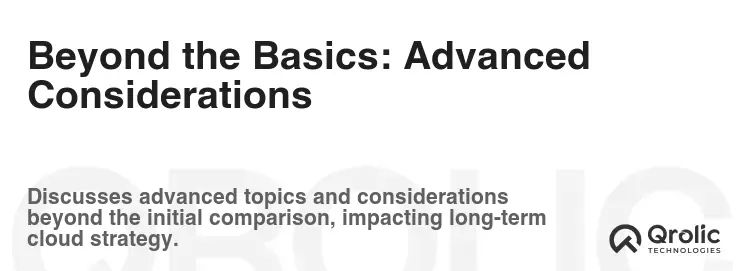
Beyond the core services, several advanced considerations can influence your decision:
- Hybrid Cloud: Both AWS and GCP offer solutions for hybrid cloud deployments, allowing you to integrate your on-premises infrastructure with the cloud.
- Multi-Cloud: Increasingly, organizations are adopting a multi-cloud strategy, using services from multiple cloud providers.
- Serverless Computing: Both AWS Lambda and Google Cloud Functions provide serverless compute capabilities, allowing you to run code without managing servers.
- DevOps Tools: Both AWS and GCP offer a range of DevOps tools for automation, continuous integration, and continuous delivery.
Qrolic Technologies: Your Cloud Expertise Partner
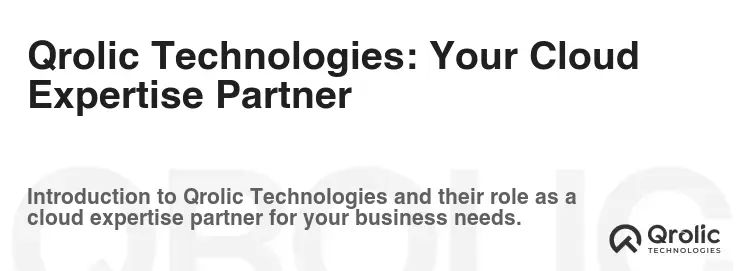
Navigating the complexities of cloud computing can be daunting. Qrolic Technologies (https://qrolic.com/) is a dedicated cloud solutions provider, specializing in helping businesses harness the power of AWS, Google Cloud, and other cloud platforms. We offer a comprehensive suite of services, including:
- Cloud Migration: Seamlessly migrate your applications and data to the cloud.
- Cloud Optimization: Optimize your cloud infrastructure for performance, cost, and security.
- Managed Cloud Services: Offload the management of your cloud infrastructure to our expert team.
- DevOps Consulting: Implement DevOps practices to accelerate your software development lifecycle.
- Cloud Security: Secure your cloud environment with our comprehensive security solutions.
Let Qrolic Technologies be your trusted partner in your cloud journey. We provide expert guidance and support to help you achieve your business goals. Contact us today to learn more about how we can help you unlock the full potential of the cloud.
Making the Right Choice: A Step-by-Step Guide
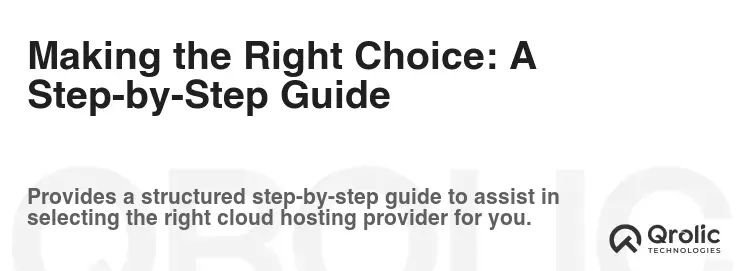
Choosing the right cloud hosting provider is a critical decision. Here’s a step-by-step guide to help you make the right choice:
- Define Your Requirements: Clearly define your business requirements, including your application needs, performance requirements, security needs, and budget constraints.
- Assess Your Skills: Evaluate your team’s existing cloud skills and identify any gaps in expertise.
- Evaluate the Services: Carefully evaluate the services offered by AWS and GCP, focusing on the services that are most critical to your business.
- Consider Pricing: Analyze the pricing models of AWS and GCP and estimate the cost of running your workloads on each platform. Use cost estimation tools provided by both vendors.
- Run Proof of Concepts: Conduct proof-of-concept projects on both AWS and GCP to test the performance and suitability of each platform for your specific workloads.
- Security Assessment: Conduct a thorough security assessment of both AWS and GCP, focusing on compliance requirements and data protection measures.
- Consider Support: Evaluate the support options offered by AWS and GCP, including documentation, training, and technical support.
- Choose a Partner: Consider partnering with a cloud solutions provider like Qrolic Technologies to help you navigate the complexities of cloud computing and accelerate your cloud journey.
- Start Small, Scale Gradually: Start with a small-scale deployment and gradually scale your cloud infrastructure as your needs evolve.
- Monitor and Optimize: Continuously monitor your cloud performance and costs, and optimize your infrastructure to ensure you are getting the best value for your investment.
Conclusion: The Best Cloud Hosting Provider is the One That Fits You
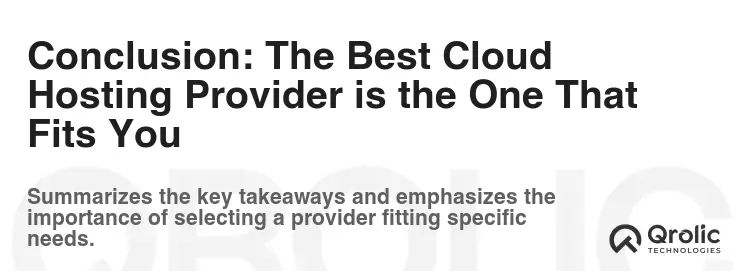
There’s no single “best” cloud hosting provider. The ideal choice depends entirely on your specific needs, priorities, and technical expertise. AWS offers a vast and mature ecosystem with unparalleled breadth and depth, while GCP provides a more streamlined and innovative platform with a strong focus on data analytics and Kubernetes. By carefully evaluating your requirements and conducting thorough due diligence, you can make an informed decision and choose the cloud hosting provider that will best empower your business to thrive. And remember, Qrolic Technologies is here to help you every step of the way! We help in cloud computing solutions that is best fit for your organization.
